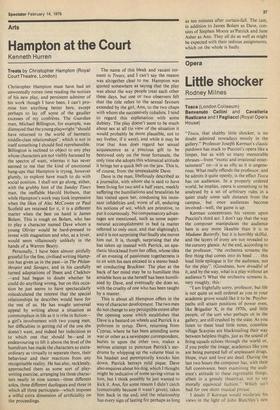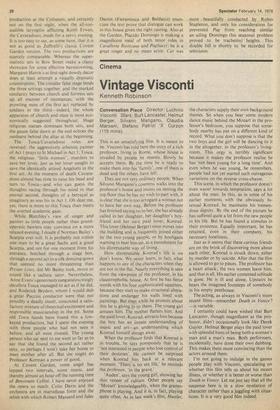Opera
Little shocker
Rodney Milnes
Tosca (London Coliseum) Benvenuto Cellini and Cavalleria Rusticana and I Pagliaccl (Royal Opera House) -Tosca, that shabby little shocker, is no doubt admired nowadays mostly in the gallery." Professor JosePh Kerman's classic putdown has stuck to Puccini's opera like a limpet, but as with so many memorable phrases—from "exotic and irrational entertainment" on—it is as silly as it is ungenerous. What really offends the professor, and he admits it quite openly, is the effect Tosca has on audiences. In a properly ordered world, he implies, opera is something to be analysed by a set of arbitrary rules in a quiet study some safe distance from the campus, but once audiences become involved—well, the game is up.
Kerman concentrates his venom upon Puccini's third act. I don't say that the way the composer manipulates the audience here is any more likeable than it is in Madame Butterfly, but it is horribly skilful, and the layers of irony are not revealed to the cursory glance. At the end, according to the professor, "the orchestra screams the first thing that comes into its head . . this loud little epilogue is for the audience, not for the play". (Goodness, how dreadful of it, and by the way, what is a play without an audience?) What the orchestra screams is, very roughly, this:
"I am frightfully sorry, professor, but life is not quite so well ordered as you in your academic grove would like it to be. Psychopaths still attain positions of power even, like Brigadier X, in the 1970s, and little people, of the sort who perhaps sit in the gallery, are still crushed by the state. As you listen to these loud little notes, countless village Scarpias are blackmailing their way between helpless thighs, just as the sound of firing squads echoes through the world or, if you prefer the image, academics like you are being pumped full of unpleasant drugs. Hope, trust and love are dead. During the last two hours the composer has, with their full connivance, been examining the audience's attitude to these regrettable things. albeit in a grossly theatrical, not to say morally equivocal fashion." Which isn't bad for one short musical phrase.
I doubt if Kerman would moderate his views in the light of John Blatchley's new
production at the Coliseum, and certainly not on the first night, when the all-tooaudible laryngitis afflicting Keith Erwen, the Cavaradossi, made for a nervy evening. It is too easy to say, as some have, that it is not as good as Zeffirelli's classic Covent Garden version. The two productions are scarcely comparable. Whereas the superrealistic sets in Bow Street make a classy showcase for some effective barnstorming, Margaret Harris's at first sight dowdy decor does at least attempt a visually dramatic counterpoint. The circular false stage binds the three settings together, and the marked similarity between church and fortress sets up all manner of resonances, with the prowling nuns of the first act replaced by soldiers in the third—indeed, the whole apparatus of church and state is most economically suggested throughout. Huge religious statues dominate both sets, and the gauze false dawn at the end echoes the sunburst behind the altar at the beginning.
The Tosca/Cavaradossi roles are reversed: the aggressively atheistic painter of Act 1 prays to St Michael in Act 3; Tosca, the religious "little woman", murders to save her lover, just as her lover sought to save the identically attired Angelotti in the first act. At the moment of death Cavaradossi almost has time to raise his head and turn to Tosca—and who can guess the thoughts racing through his mind in that eternal second, thoughts of a betrayal as imaginary as was his in Act 1. Oh dear me, yes, there is more to this Tosca than meets the averted academic gaze.
While Blatchley's view of singer and painter as little people rather than grandoperatic bawlers may convince on a more relaxed evening, I doubt if Norman Bailey's Scarpia ever will. It is probably not within one man to be a great Sachs and a good Scarpia, and not for one moment from his entrance, botched through a stage box, through a second act in a silk dressing-gown that seemed no more threatening than Private Lives, did Mr Bailey look, move or sound like a sadistic satyr. Nevertheless, Anne Evans's generously sung and excitingly dzcolletz Tosca managed to act as if he did, and Roderick Brydon, whom I would dub a great Puccini conductor were that not possibly a deadly insult, concocted a satisfactory mixture of theatrical excitement and responsible musicianship in the pit. Some old Tosca hands have found this a lowkeyed production, but I spent the evening with three people who had not seen it before, and all were riveted. The young person who sat next to me went so far as to say that she found the second act rather sexy, so perhaps I won't take her home to meet mother after all. But she might do Professor Kerman a power of good.
At Covent Garden, some angel has lopped two intervals, some music, and thereby almost an hour off the running time of Benvenuto Cellini. I have never enjoyed the opera so much. Colin Davis and the orchestra are in marvellous form and the relish with which Robert Massard and Jules
Dastin (Fieramosca and Balducci) enunciate the text prove that dialogue can work in this house given the right casting. Also at the Garden, Placido Domingo is making a magnificent meal of both tenor roles in Cavalleria Rusticana and Pagliacci: he is a great singer and no mean actor. Cav was most beautifully conducted by Robin Stapleton, and only his consideration for prevented Pug from reaching similar an ailing Domingo (his seasonal problem proved to be tracheitis) heights. This double bill is shortly to be recorded for television.



































 Previous page
Previous page